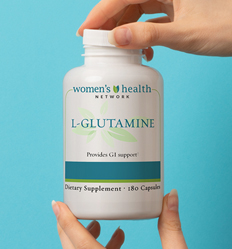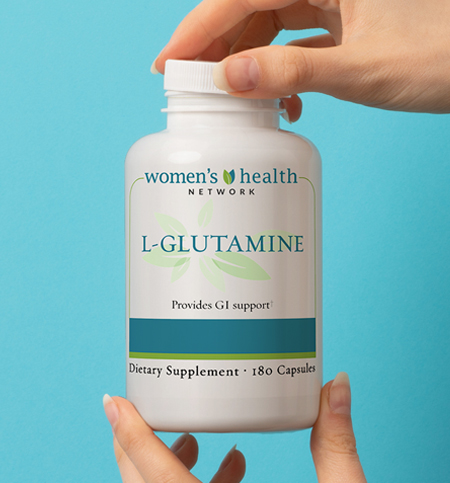Authored by Dr. Sharon Stills, NMD
L-glutamine is one of 20 different amino acids that help build proteins in the body. It can be found in protein-rich foods, including those from both plants and animals, but it’s also a compound that your body makes on its own.
Lately, there’s been a lot of excitement around L-glutamine — and for good reason! New research has shown just how much this completely natural amino acid can benefit our health – from resolving leaky gut to weight loss to improved brain function.

A little L-glutamine goes a long way. Take a look at the top five benefits.
L-glutamine improves digestive health
In one of its primary roles, L-glutamine is an essential nutrient for repairing the gut wall and helping reduce new damage. It does this by enabling enterocytes (gut cells) to regenerate more quickly, helping to seal the junctions in the gut and keep the gut lining in an optimal state. In the small intestine, L-glutamine supports healthy villi (the hair-like projections that line the entire length of your small intestine), which enhances nutrient absorption. It also promotes regular bowel movements, another factor in optimal GI tract health.
If you know or you suspect that you have leaky gut, one of the culprits could be that your body is not making enough glutamine on its own or getting enough from your diet. Adding an L-glutamine supplement could be a game changer for your gut health. If you are already taking a probiotic – great! Adding L-glutamine is another helpful tool for supporting optimal GI health.
L-glutamine is important for immune system support
Your immune system loves L-glutamine! Research shows that our immune cells depend on glutamine to survive, multiply, function and, ultimately, defend our body against pathogens. Specifically, L-glutamine boosts the immune system by supporting the production of white blood cells. One study even showed that glutamine supplementation reduced the rate of hospital-acquired infections and reduced the length of stay in the hospital.
Studies have also shown glutamine can reduce pro-inflammatory cytokine production, making it a great potential therapeutic for a host of inflammatory conditions.
Weight loss support
Glutamine supports production of serotonin, the body’s feel good neurotransmitter that is made in the gut. Serotonin, in addition to regulating mood, influences appetite signals. Glutamine also promotes healthy weight loss by helping to improve insulin sensitivity, allowing the cells of the body to use blood glucose more effectively and making your fat cells less likely to store fat. Getting enough L-glutamine is a good idea for those at risk for type 2 diabetes or already experiencing some degree of insulin resistance.
L-glutamine makes exercise easier!
As an amino acid, L-glutamine is a building block of proteins in the body. L-glutamine helps decrease muscle soreness after exercise by supporting muscle repair (muscle tissue is made from proteins). Additionally, L-glutamine stimulates the synthesis of glutathione, a potent antioxidant that helps prevent free radical damage, providing even more protection for muscle tissue when under stress.
L-glutamine also helps you sustain your energy levels during your workout by elevating plasma growth hormone, which plays a crucial role in the metabolism of fat and muscle. Glutamine is also associated with the prevention of ammonia accumulation, which can occur in the blood and brain during exercise and cause fatigue.
Improved brain function
L-glutamine’s major role in the brain is that of a precursor of the neurotransmitter amino acids: the excitatory amino acids glutamate and aspartate, and the calming amino acid GABA. It is also a vital source of energy for the nervous system.
If the brain is not receiving enough glucose, it compensates by increasing glutamine metabolism for energy. This is why you may have heard of glutamine labeled as “brain food” — it really is!
Learn more about L-glutamine and what it can do for you.











